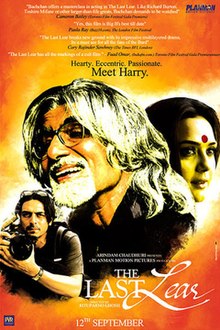The Last Lear
| The Last Lear | |
|---|---|

Movie poster
|
|
| Directed by | Rituparno Ghosh |
| Produced by | Arindam Chaudhuri |
| Written by |
Rituparno Ghosh Utpal Dutt |
| Starring |
Amitabh Bachchan Preity Zinta Arjun Rampal Divya Dutta Shefali Shah Jisshu Sengupta Prosenjit Chatterjee |
| Music by | Raja Narayan Deb Sanjoy Das |
| Cinematography | Abhik Mukhopadhyay |
| Edited by | Arghya Kamal Mitra |
|
Production
company |
Planman Motion Pictures
|
|
Release date
|
|
|
Running time
|
130 minutes |
| Country | India |
| Language | English |
The Last Lear is a 2007 Indian drama film directed by Rituparno Ghosh. The film won the National Award of India for Best Feature Film in English in 2007. The film stars Amitabh Bachchan, Preity Zinta, Arjun Rampal, Divya Dutta, Shefali Shah and Jisshu Sengupta. Shefali Shah won the Best Supporting Actress National Award for her role in the movie. It was produced by Arindam Chaudhuri of Planman Motion Pictures.
Basing the script on Utpal Dutt's semiautobiographical play Aajker Shahjahan, Rituparno Ghosh penned it in 2006, and turned to the actors in February 2007, all of whom accepted the offer. The film began shooting from 28 February 2007 to 10 April 2007; principal shooting took place in Kolkata and some shooting took place in Mussoorie, Uttarakhand. Dubbing for the film ended on 31 August 2007.
The Last Lear premiered at the 2007 Toronto International Film Festival on 9 September and received a significant reception, earning many accolades after being showcased at a Gala Presentation.
The film was later showcased at the London Film Festival, and the International Film Festival of India in Goa. The film was received positively by critics with many saying that Bachchan has given a career best performance.
The story revolves around Harish Mishra (Amitabh Bachchan), a retired Shakespearean theatre actor who spent precisely thirty years and nine months on stage and then suddenly quit, and his first and last act as a cinema artist. He is immensely passionate about Shakespeare, believes that nothing even comparable can ever be written, knows all his plays by heart, lives in those stories, condemns modern cinema and considers theatre as a much higher artform for directors and actors to convey their message to an audience.
...
Wikipedia
